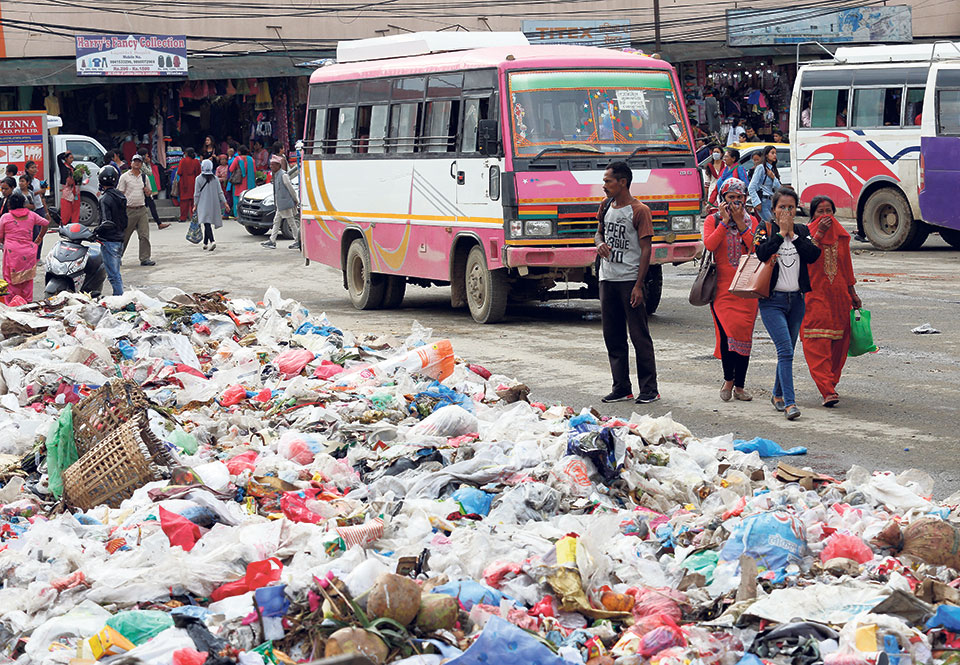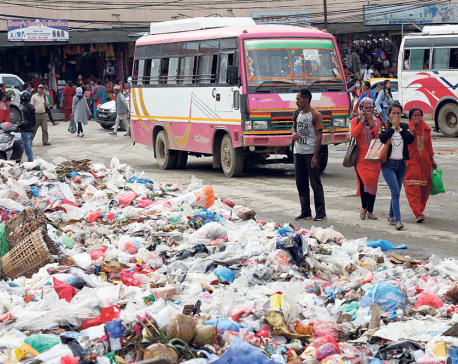
OR
Waste management in the post-pandemic scenario
Published On: March 15, 2021 07:00 AM NPT By: Anu Joshi Shrestha and Mona Sharma


Anu Joshi Shrestha and Mona Sharma
Anu Joshi Shrestha is Rural Enterprise and Value Chain Specialist and Mona Sharma Knowledge Management and Communication Officer at ICIMOD.news@myrepublica.com
More from Author
The Covid-19 pandemic can be an opportunity to transform Nepal’s waste management sector right from the household level to ensure long-term safety of all concerned.
Kathmandu produces approximately 1020 metric tonnes of municipal waste every day. Although 56 percent of this waste is organic and can be easily segregated at source for composting, most of it ends up in landfills, dumped in the open or burnt at household level. Over 19 percent of air pollutants in Kathmandu valley are estimated to come from open burning of waste.
Even before the COVID-19 pandemic, the world was facing huge challenges in the waste management sector and the air pollution associated with it. The pandemic has further exacerbated both challenges. Massive volumes of used personal protective equipment (PPE), disposable masks and gloves are discarded along with domestic and industrial waste. According to the WHO, improper management of PPEs and COVID-19 infected waste can significantly increase the risk of spreading the virus. Infected waste, if not properly marked or disposed also puts waste collectors at immense risk. Hence, there is a high possibility of waste collectors and sanitation workers contracting and transmitting the virus.
Safety concerns
Throughout the pandemic, waste workers have been working relentlessly to provide essential services. While the dedication and sacrifice of health workers have been lauded globally and in Nepal, the services of sanitation workers and agencies were overlooked throughout the lockdown. In order to gain a deeper understanding about the overall situation of waste management during the pandemic, we conducted a number of informal interviews with men and women engaged in waste collection, processing and management at individual, institutional, and government levels.
The municipality advised its workers to wear PPE and some organisations provided them to a few municipal workers. Maichori, a sweeper in Ward 1 of Kathmandu, is constantly worried about contracting the virus. She is deeply hurt when the community looks at her with suspicion as she goes about her job. She now sweeps early in the morning when no one is around. Living a hand to mouth existence, and with no monetary support from her husband, she cannot afford to buy herself any PPE.
Government and public acknowledgement of the dedication of waste and sanitation workers, and the heightened risks they face while handling waste during the pandemic will go a long way in boosting the morale of these essential workers. But more importantly, they all need to be provided with adequate protective equipment. It also brings us to the larger question: How can the current waste management system in Nepal be made more efficient and safer for all?
Managing waste disposal
Waste management is critical to health outcomes and it is vital to focus on this as an integral part of the pandemic response. Nabin Bikash Maharjan, CEO of Blue Waste to Value and Technical Advisor of Solid Waste Management Association (SWMAN) pushed to establish decentralized and mobile waste treatment centres like in other countries early in the pandemic. But this effort was not acted upon by authorities.
Given the lack of public awareness about safe handling of potentially infected waste, more efforts need to be made to educate the public on safe disposal and waste workers on safe handling of waste. It is important to map waste disposal by keeping records with complete information—on where to bring waste, what to do, and how to process, sterilize and dispose of it. WHO directives on sterilization of infected waste on-site should be followed, and collectors should be equipped with PPE.
Solid waste management expert, Dhundi Raj Pathak stresses the need to plan and implement garbage collection in a participatory manner. Household and institutional buy-ins are important to enable systemic changes in waste management in municipalities across Nepal. There is also need for data in order to properly plan the waste management process. Efficient municipality-wide waste management is likely to be achievable only if the government enforces mandatory waste management plans in all municipalities. There is also a need for municipalities to not only budget for waste management, but to also devise monitoring mechanisms and explore partnerships with private sector entities with stakes in waste management. This will enable a coordinated vision to establish and efficiently implement appropriate waste management systems.
Plans in themselves, however, are not enough. Practical implementation modalities, activity timelines and deadlines, and a system of rewards and punishment through official evaluations of concerned authorities can help in smooth implementation of plans. Government funds earmarked for environmental protection and management can also be mobilized for this task. While some municipalities have clearly recognized the importance of efficient waste management systems, more needs to be done by more local bodies and at the policy level to support effective waste management at local level through municipality and public-private partnerships.
Garbage burning
If not implemented properly, waste segregation at source and waste management can have negative consequences, not just on the environment but also on the livelihoods of waste workers. During the early days of the lockdown, households assumed there would be no regular waste collection. While some households managed their waste by composting, others burnt their waste. Ram Hira Pathak, a recycling entrepreneur, says that as a result of garbage burning, waste collection reduced initially. In that initial period, the reduction in garbage to be collected, combined with the fear of contracting the virus, resulted in many of his staff not coming in for work. In a sort of negative reinforcing loop, the lack of staff to remove garbage resulted in more garbage burning and reduced the amount of waste to be collected. Over time, many recycling businesses were forced to lay off staff.
Changing habits
Waste segregation needs to begin at the household level. Organic waste accounts for 60–70 percent of total household waste in Nepal. If managed properly, it can bring returns for households, reduce the burden on municipal workers, and extend the life of landfill sites.
In Kathmandu, although commercial activities were limited during the lockdown, there was an increase in biodegradable waste as result of people spending more time at home, and resultant cooking and cleaning. This encouraged people to try composting and terrace gardening. The pandemic related lockdown appears to be slowly changing household waste management patterns. Kathmandu municipality resident, Kamala Shrestha, told us that with more time at home, she began composting and terrace gardening for the first time. In a way, the pandemic provided an opportunity to address the longstanding issue of getting the public to segregate waste and manage biodegradable waste at source.
Enabling change
The COVID-19 pandemic can be an opportunity to transform Nepal’s waste management sector right from the household level to ensure long-term safety of all concerned, beginning as an immediate post-pandemic response and leading to better waste management and cleaner air in Nepal.
The pandemic has heightened public awareness about the benefits of clean air, and the need to maintain good hygiene. This may improve the receptiveness to government-led campaigns enforcing segregation of bio-degradable and non-degradable waste, proper collection, and disposal. A focused advocacy drive to encourage proper waste management can help catalyse a change in garbage management behaviour at household and institutional levels, including discouraging garbage burning to safeguard human and animal health, and the environment as a whole.
Rameshwor Shrestha, Mayor of Mahalaxmi Municipality in Lalitpur District, emphasizes holistic urban waste management, including solid, waste water and fecal sludge management. He highlights the importance of the 5Rs of efficient waste management: refuse to litter and produce unnecessary waste; reduce waste by lessening waste generation; reuse and repurpose what would traditionally be considered waste; recycle waste through processing; and recovery by extracting energy through treatment before final disposal. By focusing on these 5Rs right from the source of the waste at household and institutional levels, waste can be managed efficiently and holistically with multiple benefits. Green enterprises have been encouraged to develop innovative solutions to convert waste through the 5Rs, and thereby address the issues of solid waste management and increasing levels of air pollution.
While municipalities may have budgets to initiate such activities, they require support to understand and undertake efficient waste management practices. ICIMOD’s Air Pollution Solutions (APS) Initiative has initiated a partnership with the Mahalaxmi Municipality to support the mayor’s initiative on zero waste. This includes capacity building, connecting to successful strategies on waste management from the region, exploring waste-based business opportunities, and awareness raising programmes to reduce waste burning.
You May Like This

Resolving Kathmandu Valley’s solid waste problems
The waste collectors can make a schedule for waste collection. They can collect only biodegradable waste on one day and... Read More...

Valley’s waste management hindered for six days
KATHMANDU, March 31: The Kathmandu Valley’s waste management has been impeded for the past six days because of the obstruction... Read More...

What ails Kathmandu Valley’s waste management project?
KATHMANDU, Jan 24: A government-run project to manage waste from the Kathmandu Valley has failed to make headway for months.... Read More...









Just In
- Heavy rainfall likely in Bagmati and Sudurpaschim provinces
- Bangladesh protest leaders taken from hospital by police
- Challenges Confronting the New Coalition
- NRB introduces cautiously flexible measures to address ongoing slowdown in various economic sectors
- Forced Covid-19 cremations: is it too late for redemption?
- NRB to provide collateral-free loans to foreign employment seekers
- NEB to publish Grade 12 results next week
- Body handover begins; Relatives remain dissatisfied with insurance, compensation amount








Leave A Comment